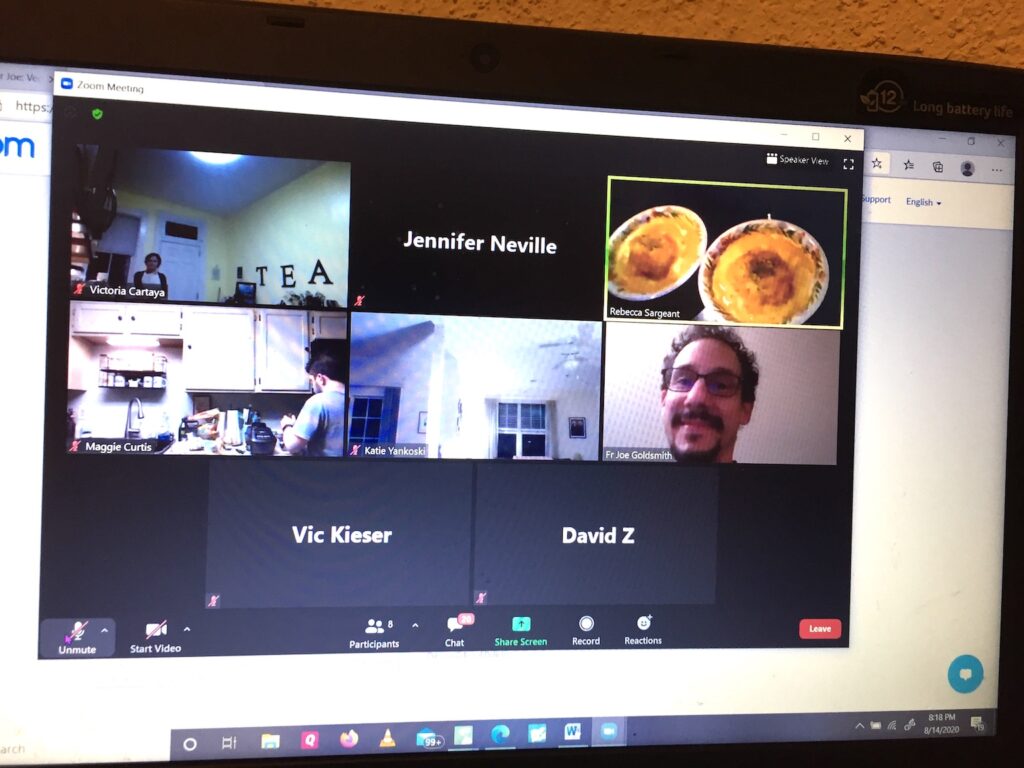Father Goldsmith shares his love for preparing food via Zoom
In a culture of “fast food” and meals on the run, virtual interactive cooking classes are helping young adults in the diocese experience the joy of cooking, the delight of “slow food” and the cultivation of relationships through a meal together.
Father Joe Goldsmith, administrator of cluster parishes in Dinwiddie, Hopewell and Prince George, is sharing his love for cooking via a monthly Zoom class where young adults make the featured recipe at home as he demonstrates how to do so. The priest has conducted classes on how to make Italian risotto, carrot soup, steak and stuffed pork tenderloin. Next up will be baked fish, crispy Brussels sprouts and balsamic reduction, 6 p.m., Friday, Sept. 25.
Katie Yankoski, diocesan associate director of youth and young adults, said the Office for Evangelization created the cooking classes due to the popularity of cooking shows and because more people are cooking and eating at home due to COVID-19 restrictions.
The classes are targeted to Catholic adults ages 21 to 35 in the diocese, but young adults from other areas may join as well. Individuals don’t have to participate in every class.
Father Goldsmith emphasizes that sharing a meal together is the “summit” of Catholic faith as Christ initiated the Eucharist at the Last Supper.
“Eating together is the context where we build connections with each other,” he said.
During the classes, Father Goldsmith explains that many Americans rely on “fast foods” — foods that are prepared quickly and consumed quickly — so the individual can get somewhere else or do something else swiftly. In some countries, he explained, food preparation and dining can be “an event rather than just a way to fulfill a hunger pang” and can give the diners an opportunity to build relationships. Thus, the priest emphasizes the importance of “slow food” — making recipes that take time to prepare and then taking time to dine together.
“Togetherness is what is important,” Father Goldsmith said. “It’s like magic when people cook and eat together. Something amazing happens.”
The message resonated with Victoria Cartaya, parishioner of St. Benedict, Richmond.
“He changed my perspective about cooking and eating,” Cartaya said. “It opened my mind to how cooking can be more spiritual… When we eat and break this bread together, it brings us in communion with each other and with the church.”
David Zaronas, parishioner of Cathedral of the Sacred Heart, Richmond, said that in addition to acquiring cooking skills, “fellowship is definitely a motivation to do the cooking classes.”
Maggie and Joe Curtis of Church of the Epiphany, North Chesterfield, said they enjoy the classes so much they make it a date night.
“Joe and I have two kids under four, so it is a really nice break to get away from the everyday chaos of life to do something as a couple,” she said.
Father Goldsmith shares tips such like how different flavors meld, which wine pairs well with a particular dish and how to use kitchen equipment. He shares cooking techniques which have included how to make roasted garlic, puree soup and cut an onion while staying dry-eyed. He also demonstrated two ways of cooking steak: searing it and then cooking it in the oven or the “reverse sear.”
On a more whimsical note, during the soup class, he tasted a teaspoon each of two brands of olive oil to see which one tasted better, and he ate a piece of fresh ginger, which inspired Rebecca Sargeant, St. Benedict Parish, Richmond, to do so as well. After experiencing the jolt of the spice, she jested that rather than consuming caffeine it could be used to keep a driver awake.
The classes give the participants an opportunity to put their own creative twist on the dishes they make. They have options for some ingredients such as choosing cream or coconut milk for the carrot soup or marinating steak in crushed pineapple or a salt bath before cooking to tenderize it.
Participants said they enjoy the hands-on format because cookbooks can tell you to do something and televised and online cooking classes can show you how, but an interactive lesson like this provides the opportunity for Father Goldsmith to observe, comment and suggest. Participants can ask him questions about the meal preparation, and they can chat with him and fellow participants as they cook. He also sprinkles in theology.
For some, the classes give the young adults the skills and confidence to make recipes that seem daunting. That was true for Sargeant who said she particularly enjoyed the stuffed pork tenderloin class where she learned how to cut the pork, fill it, wrap it back up and secure it with twine.
“It was something I wouldn’t have tried to make on my own, so it was nice to have someone take me through it step by step,” Sargeant said.
At the end of each class, participants have a “show and tell” in which they present their dishes complete with garnishes and “describe their final outcome because all of the dishes will look different at the end.”
For Sargeant, that’s a high point of the class.
“I like to see the creative and artsy ways other people plate their food,” Sargeant said.
Register for each class at [email protected].

